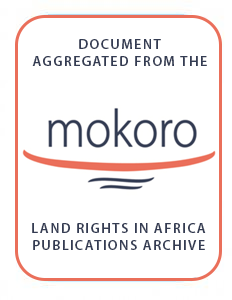Gender-based violence and property-grabbing in Africa: a denial of women’s liberty and security
Contains defining gender-based violence; property grabbing as a form of this; HIV and AIDS and property grabbing; women’s property rights: the erosion of customary norms and practice; statutory legal reform � is it the answer?; empirical evidence from Southern and Eastern Africa; responses to property grabbing; conclusion. Argues that the harassment and humiliation that often accompany property grabbing further strip women of their self-esteem, affecting their ability to defend their rights.






